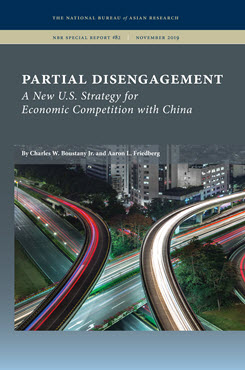 China has long followed a predatory approach to its economic relations with the U.S., deploying subsidies, tariffs, and non-tariff barriers while restricting investment in “strategic sectors” of its economy. Meanwhile, the U.S. has remained comparatively open to Chinese imports and investment. In the last two years, however, the environment has shifted rapidly, with the Trump administration using tariffs and other executive actions to try to compel China toward greater openness while simultaneously attempting to restrict Chinese investment in the U.S. economy, control technology transfer, and reduce reliance on some Chinese-made products. While tariffs are controversial, growing bipartisan concern about national security and economic risks posed by China has resulted in legislation that tightens investment screening and export control regulations. Although there appears to be widespread support for a tougher stance toward China, a clear and comprehensive strategy is still lacking.
China has long followed a predatory approach to its economic relations with the U.S., deploying subsidies, tariffs, and non-tariff barriers while restricting investment in “strategic sectors” of its economy. Meanwhile, the U.S. has remained comparatively open to Chinese imports and investment. In the last two years, however, the environment has shifted rapidly, with the Trump administration using tariffs and other executive actions to try to compel China toward greater openness while simultaneously attempting to restrict Chinese investment in the U.S. economy, control technology transfer, and reduce reliance on some Chinese-made products. While tariffs are controversial, growing bipartisan concern about national security and economic risks posed by China has resulted in legislation that tightens investment screening and export control regulations. Although there appears to be widespread support for a tougher stance toward China, a clear and comprehensive strategy is still lacking.
POLICY IMPLICATIONS
This report recommends a four-part strategy for defending U.S. prosperity and security by moving toward a posture of partial economic disengagement from China:
Achieve a ceasefire in the current tariff war. The U.S. should avoid a superficial deal that would relieve pressure on Beijing without extracting fundamental concessions. Instead, it should seek at least a temporary settlement that reduces costs to U.S. consumers and producers, while retaining restrictions on select Chinese imports.
Strengthen defensive measures to reduce vulnerabilities to surveillance, sabotage, or disruption and to slow diffusion of critical technologies to China. This will require constricting the outward flows of some technology to China, while regulating the inward flows of some Chinese goods, capital, and people to the U.S.
Invest in innovation, technology, and education. These investments must come from both public and private sources. Boosting public-sector investment will require addressing long-standing fiscal imbalances.
Strengthen trade and investment relationships, cooperation, and information sharing with close allies. While continuing to seek reform of multilateral institutions, the U.S. should work with key allies to bolster a partial (as opposed to a global) open trading system. This system should be built on high-standard plurilateral trade agreements and common approaches to securing data and promoting economic development.
Charles W. Boustany Jr. is a Counselor at the National Bureau of Asian Research. He is Co-chair and a Principal Investigator of the Taskforce on Transforming the Economic Dimension of U.S. China Strategy.
Aaron L. Friedberg is Professor of Politics and International Affairs at Princeton University and a Counselor at the National Bureau of Asian Research. He is Co-chair and a Principal Investigator of the Taskforce on Transforming the Economic Dimension of U.S. China Strategy.
No comments:
Post a Comment